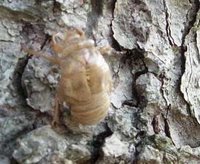 I think the annual cicada plague is drawing to a close.
I think the annual cicada plague is drawing to a close.Over the past week or so, I've begun to see the bodies of the little beasties laying on the sidewalk each morning in various stages of dead.
So it shouldn't be long before we can sit out on the front stoop again and have a pleasant conversation about the day's events without having to shout at each other to be heard over the chainsaw mating calls of these little critters.
Still, as a learning opportunity these buggers and their molted shells have made a pretty good science lesson for our three -(and a half)-year-old daughter. She has been fascinated with the shells that utterly covered the spruce tree in our front yard.
It all began when, before picking her up from preschool one day, I picked a cicada shell from a nearby tree and had it "grab" the front of my shirt and hang on. I thought it would be funny to walk into a room full of kids with the little hitchhiker stuck to my shirt and see their reactions.
True to form, when my daughter saw it she pointed and laughed "Hey, you've got a cicada on your shirt!"

She grabbed the shell (being careful not to smash it in her three-year-old death grip), and went to show it to some of her friends. The teachers chuckled at my little amusement even as some of the kids squealed in delighted horror.
The More You Know: Fun facts about Cicadas
- The cicadas commonly found around Kansas City are called annual or dog day cicadas because they emerge in late July and early August, the dog days of summer.
- Cicadas use special membranes to make their "songs" as opposed to crickets and grasshoppers, which rub their legs together.
- Some cicadas produce sounds louder than 106 dB, among the loudest of all insect-produced sounds. (Here's a sample courtesy of Happy in Bag).
- Cicadas are sometimes called "locusts", although they are unrelated to true locusts, which are a kind of grasshopper.
- Only male cicadas sing.
- The cicada's long life cycle (anywhere from 3 to 17 years depending on the species) is an evolutionary adaptation to fight the effects of predators

I like the cicadas.
ReplyDeleteCicadas are my friends.
They help drown out the voices in my head telling me to do bad things.
I'll be sorry when they're gone.
So will everyone else.
Mwahahahahahahaha.
Just kidding. They don't really drown out the voices in my head!
Ah geez. I crack myself up.